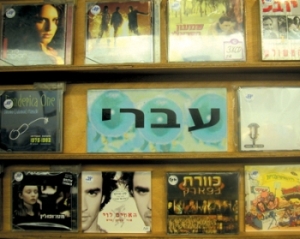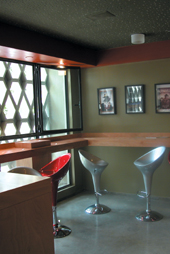|
CULTURE
The Third Ear
The Third Ear provides Israelis with a
place to hear and see the many different genres of music and film that
aren’t found in mainstream culture.
by Heidi J. Gleit
In a small country
like Israel, there is a limited market for music and movies. As a
result, most music stores only carry a limited selection of popular cds
that they know will sell and the movie rental shops do the same. They
simply feel like they cannot afford to take the risk of stocking a wide
selection of merchandise that might not sell.
The Third Ear,
however, takes a different approach. “We love music and culture and want
to share the music and movies we love with the public,” Third Ear owner
Eli Hayon explained. “We are not a regular commercial enterprise.”
The Third Ear began
as a second-hand record store in a small space on Shenkin Street in Tel
Aviv 20 years ago, Hayon recalled, noting that at the time Shenkin was
simply another street in Tel Aviv with
 small
shops mixed in with apartments. It had not yet developed into the
stylish playground for hip Tel Aviv residents that it is today, lined
with clothing and jewelry boutiques, cafes and restaurants, and
small, quirky shops
catering to the latest trend. Despite its less-than-prime location and
small size, the Third Ear’s eclectic collection soon drew music lovers
from all over the country. It was one of the only places in Israel where
they could find classic rock and classical music that wasn’t mainstream. small
shops mixed in with apartments. It had not yet developed into the
stylish playground for hip Tel Aviv residents that it is today, lined
with clothing and jewelry boutiques, cafes and restaurants, and
small, quirky shops
catering to the latest trend. Despite its less-than-prime location and
small size, the Third Ear’s eclectic collection soon drew music lovers
from all over the country. It was one of the only places in Israel where
they could find classic rock and classical music that wasn’t mainstream.
The shop grew over
the years, branching into art films and adding new cassettes, videos,
compact disks and dvds to its shelves, alongside the second-hand
records. The Third Ear rented additional space in adjacent buildings on
Shenkin Street to accommodate its growing collection and opened a video
library in Jerusalem and a video library and music store in Haifa so
that its customers wouldn’t have to travel so far. The shop’s growth was
a natural response to the Israeli public’s increasing appetite for more,
non-mainstream options. In recent years, as Israelis began to travel
abroad more, they have become more aware of and interested in various
genres of music.
From Selling to Producing
A few years ago, the
Third Ear added producing music to its repertoire. It now operates two
record labels, Earsay, for alternative and electronic music, and Magda,
for ethnic music. Over the years, Hayon had become familiar with many
Israeli musicians and their struggles to produce an album of their own.
Even though many of them were talented and regularly played to full
houses at Tel Aviv nightclubs, the major labels weren’t interested in
working with artists unless they believed their albums would have a mass
appeal. However, Hayon applied the same theory to producing music as he
had to selling it and began to produce albums for musicians whose work
he liked.
“I focused on the
quality of the music and not on how many copies it would sell. My goal
wasn’t to make money, but to provide talented artists with an outlet for
their work and bring a different type of music to the Israeli public,”
Hayon said.
This approach has
helped little-known artists gain popularity and also attracted
successful musicians who wanted to work somewhere where the focus was
more on the music than the money. The labels today represent a wide
range of Israeli artists, from Rockfour through the Israeli Andalusian
Orchestra to Yair Dalal. Many of the artists, such as Rockfour, have
even become popular abroad and the Third Ear ships their cds to music
stores in the U.S. and Europe.
A
New Home
As the Third Ear
grew, its original home on Shenkin Street began to get cramped, impeding
further growth. Plus, even though the street has an alternative
reputation, the large crowds it attracts have turned it into an
extremely commercial area. Last summer, the Third Ear moved to new
premises on King George Street, across the street from the Dizengoff
Center shopping mall. Though it is only a 10-minute walk from the
previous site, the atmosphere here is very different. Though Shenkin had
become overly commercial, it was only a two-lane street; King George is
twice the size, with twice as much noise and commotion. Even though the
mall is across the street, it is more of a business area than a
recreational one.
“The location is not
that important. We don’t need to be in a specific area to preserve our
character, especially when that area has changed,” Hayon said.
 Though
the space at King George is new, clean, and full of light, it still has
the underground, alternative feel that the original shop did. It may be
because of the music playing in the background and the big cabinet of
records in the corner, or it may be the unique design and carefully
selected staff. The large, multi-level space that houses the store is
divided into small areas for different types of music and film. This
gives each area an intimate feel, but the high ceilings, open
stairwells, and big glass windows prevent the different sections from
feeling cramped. Each area has its own staff, all of whom are music
lovers and movie buffs who are knowledgeable about their genre. More
than a few of the staff members also are musicians and sound
technicians. Though
the space at King George is new, clean, and full of light, it still has
the underground, alternative feel that the original shop did. It may be
because of the music playing in the background and the big cabinet of
records in the corner, or it may be the unique design and carefully
selected staff. The large, multi-level space that houses the store is
divided into small areas for different types of music and film. This
gives each area an intimate feel, but the high ceilings, open
stairwells, and big glass windows prevent the different sections from
feeling cramped. Each area has its own staff, all of whom are music
lovers and movie buffs who are knowledgeable about their genre. More
than a few of the staff members also are musicians and sound
technicians.
The most exciting
part of the new facility is on the floor above the store, which boasts
five private movie theaters, with a total of 120 comfortable seats,
surround sound, and state-of-the-art projection facilities, and a small,
stylish reception area with a fully stocked bar and a popcorn machine.
“We wanted to create
a space that provides a different type of movie experience than a
commercial theater,” Hayon explains, adding that the halls also can be
used for small concerts.
Art films,
documentaries, and great-but-unknown movies are screened regularly and
open to the public for a symbolic fee. The theaters also can be rented
for private parties. The Third Ear in Jerusalem also has a movie theater
that seats 35.
Now that the Third
Ear is settled into its new home, Hayon hopes that it will continue to
grow in new directions. Hayon is hoping to add a section with books and
magazines about music and film soon.
This
article
appeared in ERETZ Magazine 103. To subscribe to ERETZ Magazine,
click here.
|

